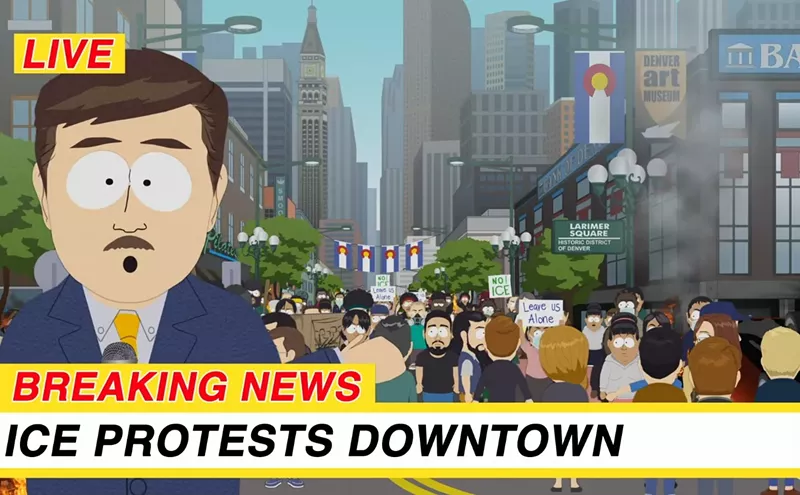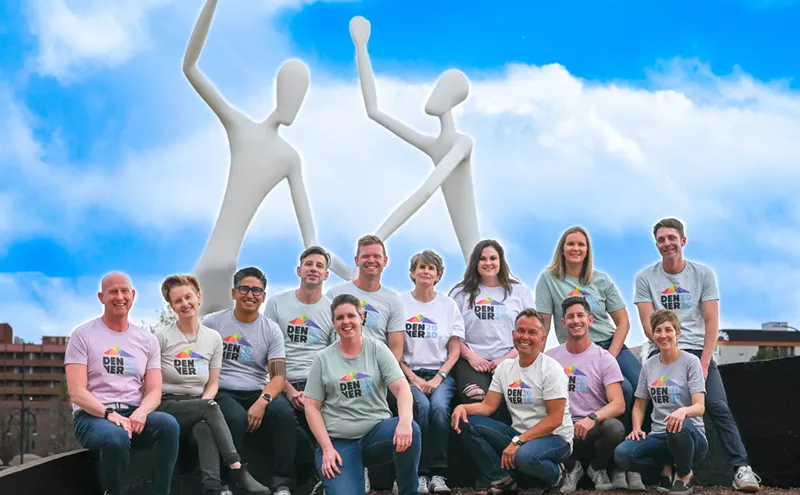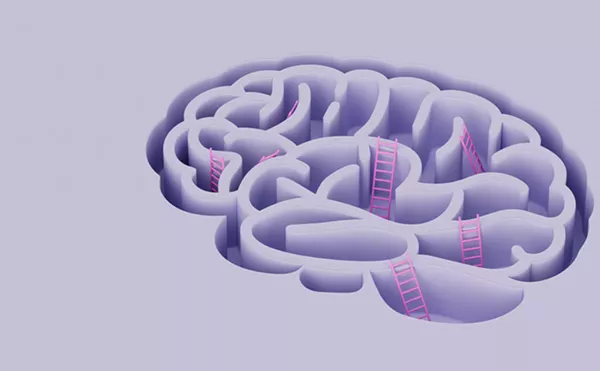Tom Tancredo has been stirring the political pot in Colorado for two decades. In the Seventies, he and other freshman legislators who hated environmental laws and other government mandates were dubbed the "House Crazies." They were successful in installing a new speaker, rancher Bob Burford. When Ronald Reagan became president, he gave them--and like-minded Westerners such as James Watt--national authority. One of them, Anne Gorsuch, became director of the Environmental Protection Agency. (She later quit amid a scandal.) Her boyfriend--and later husband--Burford took over the Bureau of Land Management. Tancredo became regional director of the U.S. Department of Education. (One of his bosses was deputy secretary Gary Bauer, now D.C. lobbyist for Focus on the Family.)
In early 1985 the liberal group People for the American Way charged that "the evidence is mounting of a direct pipeline from Mr. Tancredo's desk to radical religious zealots who interpret their self-styled biblical mandate as a license to act as a `religious KGB,' harassing anyone who dares to speak out against their vision of a Christian nation." ("You talk about conspiratorial," says Tancredo, who notes that he didn't become an active Christian until two and a half years ago. "The conspiracy was in the minds of people pushing this issue.") Tancredo kept his job for twelve years, until the Clinton administration ousted him almost immediately upon taking over.
These days, Tancredo continues to crank out ideas; he's pushing for a "civil rights" initiative for the 1996 ballot in Colorado that would ban affirmative-action programs. And he insists that the current schism in the local GOP has existed for years. "Only it wasn't called the `religious right' back then," he says. "The liberal side of the party has seen this as an epithet they can throw around: `conservative Christian.' This thing with the fundamental Christians is completely overblown. They're conservative Christians. So what? That implies a certain type of character. It's bound to improve the quality of the people in public service."
Whatever the cause, GOP politics in the area are more than slightly schizoid. Last spring the Boulder County Republican Party chairman, moderate ex-Longmont mayor Bill Swenson, hosted a precinct caucus at his own home and couldn't even get elected as a voting delegate to the party's county convention. He did wind up squeaking out a win in the primary for Colorado House District 12.
But Republican moderates took a crushing blow when Sharon Klusman, a party chairwoman in Clear Creek County, breezed into the congressional primary as a favorite to take on Skaggs--and then was trounced by Miller. Of the four candidates in the primary, only Miller was opposed to abortion. Her three opponents split the pro-choice votes, while Miller won with 38 percent of the vote. She spent less than $10,000 and didn't even put up any yard signs. Klusman put $20,000 of her own money into her campaign.
It was the second straight bitter defeat for Klusman. A late entry into the 1992 GOP congressional primary race after another moderate Republican was ruled ineligible to run, Klusman lost to Bryan Day, the Southern Baptist minister from Arvada who then was overwhelmed by Skaggs.
Miller and her allies simply outsmarted everyone else in '94. Fearing that moderate Republicans would try to sabotage her bid at the party caucus, she petitioned her way onto the ballot and turned in her signatures even before the caucus met. Rumor had it that her forces then voted for pro-choice Ted Engel at the caucus, ensuring him a place on the ballot with Klusman. Miller says it was the Christian Coalition, not her campaign, that orchestrated that canny move. "I had nothing to do with it," she says. "I can't be responsible for what other people do." A third pro-choice candidate, Michelle Lawrence, later petitioned her way onto the ballot, further fragmenting the vote.
"Bryan was not a savvy player," says Klusman. "Pat is. Look at what she did to me." But Klusman says that by putting Miller on the ballot in the general election, GOP voters probably handed another term to Skaggs.
That's not a given, says Diane Dillingham, president-elect of Colorado Republicans for Choice. "I can't say that moderate Republicans are particularly inspired or driven," she adds. "If David Skaggs thinks that just because of the abortion issue they'll listen to him, he'll wake up out of office."
Still, says Dillingham, Miller has some of her own problems--mainly her perceived link to wacko Patriots. "It's not just the abortion issue," Dillingham says. "It's the black helicopters, the U.N., the Trilateral Commission thing."
Pat Miller has a habit of sharing conspiratorial winks and stories with those she perceives as comrades up in arms. In mid-August, for example, she was one of several candidates--along with Tom Tancredo--speaking at a meeting off Colorado Boulevard sponsored by Guardians of American Liberties, a self-described "national coalition of American patriots and citizens" headquartered in Boulder.
Emceed by Marty Nalitz, the gathering drew only a smattering of noncandidates. When Miller's turn came, she told the crowd exactly where she stood by relating a letter she had received from an unnamed "congressperson."
"She sent me her agenda," Miller recalled. "And she said, `We'll be happy if you win because we'll all be working together on these kinds of issues.' And it was spousal abuse, sexual harassment, and I told my husband about it and I said, `You know, I am not going to Congress for these kinds of issues. I'm not. And he says, `Well, don't tell 'em that until you get there.'"
When the laughter died down, Miller reminded the audience that this is a "pivotal point in the future of our country." She told of a woman she ran into at a K mart who complained about moral decay and was fearful that the United States might not even "make it" to 1996.
"There is real fear," Miller said. "And maybe that's what it takes. It's for people to finally get fearful enough to get out there and make a change."
Another speaker at the GOAL meeting was state representative Charlie Duke, who hit the national big time earlier this year when he was invited on the air by Rush Limbaugh to tout his 10th Amendment movement for states' rights.
"I don't want to kid you for a second," Duke warned the GOAL crowd. "We're dealing with something evil here. We're dealing with something that took over a nation led by Christ, created by Christ and put in place by Christians. We're dealing with something that has been gripped by something that is very un-Christianlike."
Just go to the legislature, Duke suggested. "If you listen real close and you really turn up your sensitivity," he said, "you can feel the evil that's going through that body...You can hear the cackling in the ceiling. You can hear the smiles of the Beast as it's trying to force its puppets to do its bidding. And it's successful at it. And they laugh at people like Pat and myself. That's the kind of battle we're in here, folks. We're in a battle to recover our country."
Miller also found a sympathetic audience in late August at a meeting of the Adams County chapter of United We Stand America, the group started by presidential pretender H. Ross Perot. Dissatisfied with public officials and public schools, many of Perot's supporters have more of a libertarian bent than a religious one. Nevertheless, one of the twenty people at the meeting in Northglenn proudly piped up during Miller's pitch, "I'm the religious right and proud of it." Miller walked over to the woman with a big grin, shook her hand and cracked, "Do you want to run for office?"
The Perotistas are a potential gold mine for Miller--Perot got 23 percent of Colorado's vote in '92, above his national total of 19 percent, and he ran even stronger in Denver's suburbs. But many in the audience were unfamiliar with Miller. That didn't last long. Asked if she was for "one-world" government, Miller replied, "Under God." And when audience members grumbled that the government "is against us," she agreed.
When one person, referring to the Branch Davidian fiasco in Texas, accused the government of "murdering those people," Miller replied, "I know they did."
Miller also let the audience in on a little secret about her friend Tom Tancredo, who had spoken at the Perot group's previous meeting. While barred by federal law from electioneering for a candidate because of his recent stint as a federal official, Miller says, Tancredo helped her out anyway. Tancredo says he doesn't recall doing it, but Miller proudly told the Perot group: "He let his beard grow and wore a ball cap and went door to door with my fliers."
It's that kind of commitment Miller tried to instill a few days later during a private rally for her volunteers at the Meadowglen Clubhouse in north Arvada. One of her workers exhorted the enthusiastic crowd of sixty to work "person to person" because the "media is not Pat's friend." Miller herself reminded the volunteers that the district, although containing more Democrats than Republicans, has a huge number of unaffiliated voters. In fact, the 2nd is the only congressional district in the state that has more unaffiliated voters than members of either party. "We can get the unaffiliated and the disgruntled Democrats," she said.
After introducing Jim Congrove and state Board of Education candidate Patti Johnson to the crowd, Miller showed off her mom, a newly registered Republican who chipped in with a hearty "Go for it!" And then the session got down to business. The losing candidate in '92, Bryan Day, came forward to offer strategy and to plead with the volunteers for money. "If you write a house payment and you don't write a check to Pat Miller," he said, "shame on you!"
Day wryly admitted that he was "an expert on losing to David Skaggs," but he couldn't help noting, "They painted me as an extreme religious-right kook. And I'm the same religion as Clinton and Gore!"
Skaggs immediately challenged Miller to debates after she won the primary (he was unopposed in his). But she balked, saying she was convinced that she wouldn't fare well at the hands of reporters.
The first head-to-head clash between Skaggs and Miller didn't occur until September 6 in front of the Northglenn-Thornton Rotary Club. While Miller was late in arriving, Skaggs, looking professorial in a dark suit and tortoise-shell glasses, extolled the virtues of "representative government" and explained "why I think I've been doing it reasonably well."
Miller showed up in a red suit, apparently determined to answer some unasked questions. "I'm not the extreme right wing of the Republican Party," she assured the Rotarians. "I'm mainstream. I'm not a scary person."
Skaggs, however, contended that "it was a very marginal part of the Republican Party that she emerged from." Miller tried to portray Skaggs as such an extremist on the issue of abortion that he couldn't even support her parental notification initiative.
After Miller declared in response to a question about education that the U.S. Department of Education "shouldn't exist" --and neither should "nationalized standards" for the schools--Skaggs rested his case on that issue. But he couldn't do that with the crime bill, which he voted for. "I had some misgivings," he said. "Unfortunately, you can't press `maybe.'"
Miller responded with one of her favorite lines: "I thought the crime bill deserved capital punishment."
Neither attempted bon mot made the Rotarians snap to attention. But the audience took notice when things got hotter. "He accuses me of distancing myself from the abortion issue," Miller said. "And he distances himself from Clinton, whom he's supported 82 percent of the time."
Just as the two were beginning to get testy, club president Odell Barry, himself a prominent local Democrat, called a halt.
Miller was much more at ease later that afternoon, when she drove up I-25 to Johnstown to be a guest on KHNC's USA Patriot Network. Her timing was perfect. Filling in for regular host Norm Resnick, the conservative Jewish motormouth who was off because of Rosh Hashanah, was state senator Jim Roberts from nearby Loveland. What could be better for two politicians running for office than to have two hours of free radio time on a station that, thanks to its shortwave link, beams all the way across North America?
"The Democrats say that Republicans have to forsake the Christian right," Roberts intoned during his introduction. "But that's not true. Pat Miller won."
With all the confidence of true believers, Roberts and Miller conversed amiably with a slew of tough-talking, disgruntled callers, playing to their fears about the direction of the country.
While Roberts and Miller talked, Marty Nalitz, whose show was to follow, stood in another room, browsing through a sheaf of drawings of various types of black helicopters the government might be sending after them. The station was getting ready to publish the drawings in its U.S.A. Patriot News magazine as a sort of consumer guide to identifying the mysterious crafts.
"The grassroots movement is fed up," Ray from Vermont told Roberts and Miller back in the studio. "Peaceful means are going to be exhausted."
"Yeah, I understand what you're saying," said Miller, who answered Ray's query about when "armed revolution" will start in this country by saying that the crime bill "brought us a step closer."
"People consider us fanatics, terrorists, lunatics," said Ray. "Well, George Washington was a fanatic." Roberts and Miller agreed, and Miller added, "At this point, I think there are some things worth dying for."
For most of the last hour, the Roberts-Miller show was dominated by a call from Larry Bates, head of First American Monetary Consultants in Fort Collins, which publishes a magazine that warns against the New World Order and the "coming financial collapse" of the U.S. and urges a return to "biblical principles." When he wasn't taunting liberals as "crybabies," Bates (himself a former congressional candidate in Tennessee) effusively praised Roberts and Miller and blasted Congress as dominated by "members of the privileged class." No mention was made on the air that Roberts is employed by Bates, who has also contributed money to Roberts's campaign.
As the afternoon wore on, the three beat a steady tattoo into Skaggs's hide. "You can't find a more socialist congressman than Skaggs," Roberts concluded. And Miller said, "They expected a little church mouse, one issue only. Well, I've got an arsenal ready for him."
It was no surprise that the Jim and Pat Show on KHNC didn't hit the papers the next day; most talk radio is ignored by the press. And, predictably, Miller wasn't surprised when she read the newspaper stories about an event the same day that wasn't ignored: her first joust with Skaggs. "It was exactly what I thought it would be," she told a reporter. "That's why I don't want to do debates...It makes me mad, because he's going to tie me to abortion, which is the natural thing to do. But I tie him to Clinton and it's not printed."
That's a complaint she often makes to her supporters, such as the Patriot group she addressed on September 12 at the American Legion hall in Boulder. After the Patriots briefly discussed other issues--including rumors of mysterious troop and materiel convoys and sightings of black helicopters--and got the chance to pick through reading material on the Posse Comitatus, Miller received a warm welcome.
"There are a lot of issues that are near and dear to my heart that I don't talk about a lot in the press," she told the group of thirty people. "I'm very glad there are groups like this meeting. It's restoring my faith as to what America is all about. And when I make statements about the black helicopters and the U.N. and all that, I am expressing real concerns that folks know about and newspapers have no idea. So I'm glad for talk radio. And I'm glad for groups like this who are getting out real good information and truth.
"I'm not trying to be stealthy," added Miller. "I'm sorry I don't have enough money to make a big splash. I'm not a stealth candidate. I'm just out there working very hard. And it's folks like you who are going to put me in office."
end of part 2












